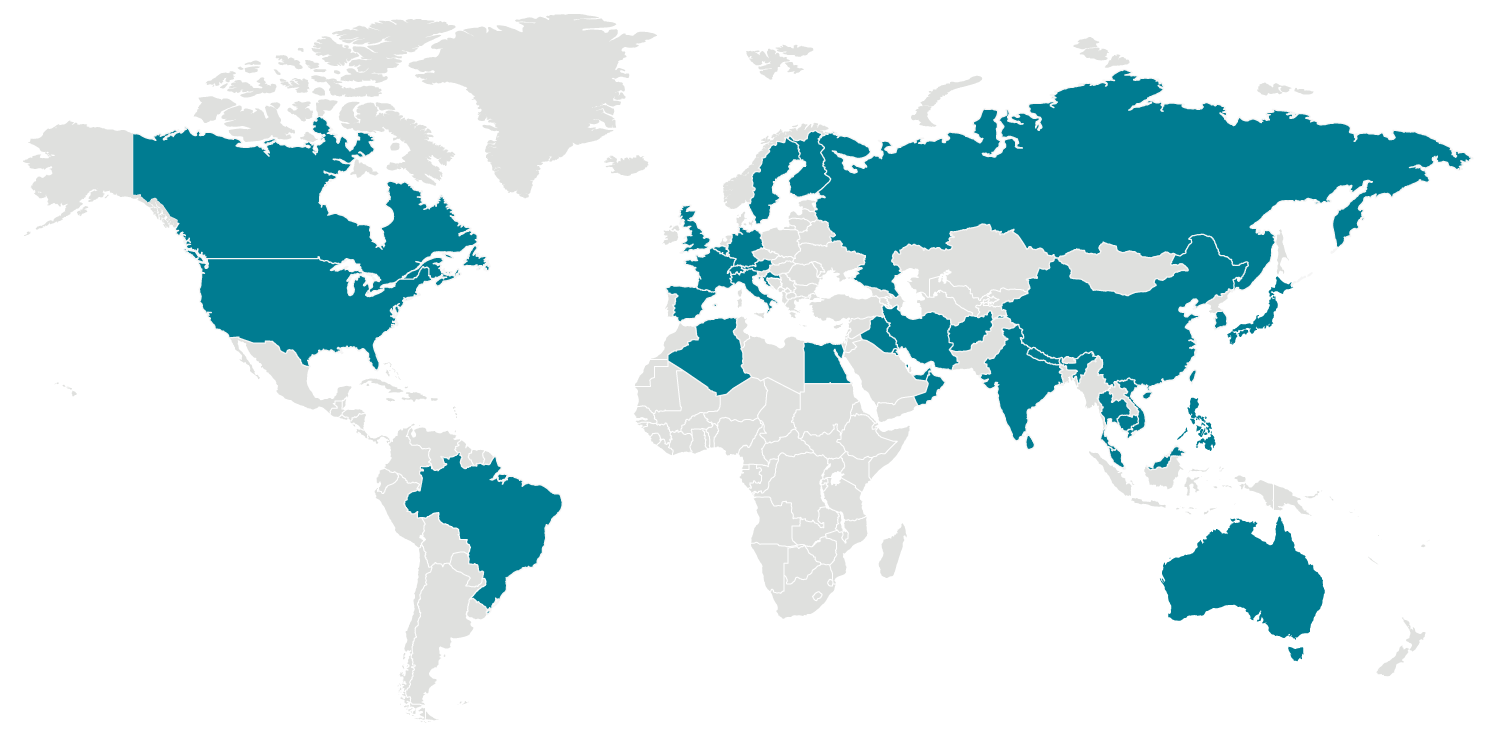Overview
▪ Though the spread of the virus appears to be declining in China, it is showing no signs of slowing down across the globe.
▪ Reported cases have exceeded 80,000 and fatalities have surpassed 2,700.
▪ US Health officials expect a wider spread domestically, while Japan, Italy, South Korea, and Iran are materially affected already.
▪ Reported cases have exceeded 80,000 and fatalities have surpassed 2,700.
▪ US Health officials expect a wider spread domestically, while Japan, Italy, South Korea, and Iran are materially affected already.
Market Reaction to Latest News
Though COVID-19 has been widely known since the middle of January, investor complacency was evident until the recent news of its spread outside of China caused shocks in the investment world.
The S&P 500 Index declined 7.6% through February 25 from the all-time high set on February 19. Broad global equity benchmarks experienced similar weakness. The MSCI EAFE Index was down 4.9%, MSCI Emerging Markets Index declined 4.3%, and Nymex Oil fell 6.4%.
The S&P 500 Index declined 7.6% through February 25 from the all-time high set on February 19. Broad global equity benchmarks experienced similar weakness. The MSCI EAFE Index was down 4.9%, MSCI Emerging Markets Index declined 4.3%, and Nymex Oil fell 6.4%.
Asset classes that provided ballast during the equity market sell-off include traditional safe-havens such as US Treasuries and Gold. The 10-year US Treasury bond yield reached an all-time low of 1.31% (closing at 1.35%), down from 1.57% as of February 19 Gold appreciated 2.4% over the same period.
| February 19th Close | February 25th Close | Change | |
|---|---|---|---|
| S&P 500 | 3386.2 | 3128.2 | -7.6% |
| MSCI EAFE | 2018.5 | 1918.6 | -4.9% |
| MSCI Emerging Markets | 1103.7 | 1056.5 | -4.3% |
| Nymex Oil | 53.3 | 49.9 | -6.4% |
| Gold | 1611.8 | 1650.0 | 2.4% |
| US 10-Year | 1.57% | 1.35% | -0.2% |
Economic Impact Based on Market Reaction
The predominant economic concern is the impact on global growth as effort and resources are committed to curtailing the spread of the virus. Resulting supply chain disruptions create concern for manufacturing businesses, while consumer decisions to “stay home” hamper service-related sectors and have already led to widespread travel cancellations.
Although impacts to the real economy may prove short-lived, uncertainty surrounding the ability to contain the virus has clearly resulted in increased market volatility. Market drops such as those witnessed in recent days are known to be an unavoidable feature of investing and may persist until the coronavirus has fully run its course. Of note, the widespread belief that equity valuations had been stretched presumably enhanced the market’s downside vulnerability.
Locations with Confirmed COVID-19 Cases
 Source: CDC, WHO
Source: CDC, WHOExpectations and Plans Moving Forward
Historically, the number of confirmed cases in comparable epidemics typically has risen sharply for 8 to 10 weeks before peaking out. While COVID-19 is likely to be declared a “pandemic,” this is in recognition of its global impact rather than a statement on its severity. Mortality outcomes across demographics vary widely, and the US expects to begin human trials on a vaccine within six weeks.
It will be important to watch monetary and fiscal policy responses, with stimulus already taking place in China and expectations rising for others to act. The market is now discounting at least two 25 bps rate cuts by the US Federal Reserve under the assumption of weaker economic conditions. While the true efficacy of such action could be questioned, markets have responded well to such prescriptions in recent years.
It will be important to watch monetary and fiscal policy responses, with stimulus already taking place in China and expectations rising for others to act. The market is now discounting at least two 25 bps rate cuts by the US Federal Reserve under the assumption of weaker economic conditions. While the true efficacy of such action could be questioned, markets have responded well to such prescriptions in recent years.
Investment Implications
With the current bull market in its 11th year, it is always difficult to determine what the catalyst will be for the next correction or bear market, the “unknown unknown.” Governments around the world, particularly in Asia, will want to curtail the spread of the virus as soon as possible to guard against any further negative economic impact.
Trying to predict when the outbreak will be contained and markets will rebound is an exercise in futility. Instead, broad portfolio diversification is a tried and tested approach to maintain market exposure for whenever the rebound occurs while avoiding the downside of an all-equity portfolio.
Should you have any questions about the economic impact of the coronavirus, please contact a member of our team using the CONTACT US button below.
Source: Asset Consulting Group (ACG) 2020.
This summary is intended to provide general information only, may be of value to the reader and audience, and is reflective of the opinions of Parkside Financial Bank & Trust. This material is not a recommendation of any particular security or investment strategy, is not based on any particular financial situation or need, and is not intended to replace the advice of a qualified attorney, tax advisor or investment professional. Diversification does not guarantee a profit or protect against all risk. This is not intended to be tax advice or legal advice. Consult a tax specialist regarding tax implications related to any product and specific financial situation. Data contained herein from third-party providers is obtained from what are considered reliable sources. However, its accuracy, completeness or reliability cannot be guaranteed, and is subject to change rapidly as additional information regarding global conditions may change.
Investments are not insured by the FDIC or any government agency, provide no bank guarantee, are not a deposit and may lose value.


